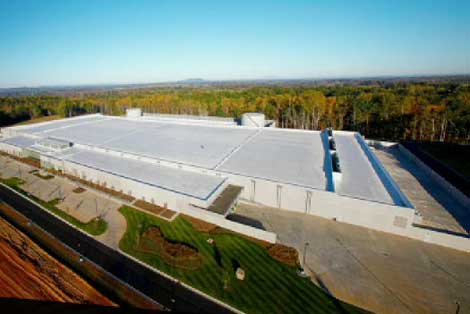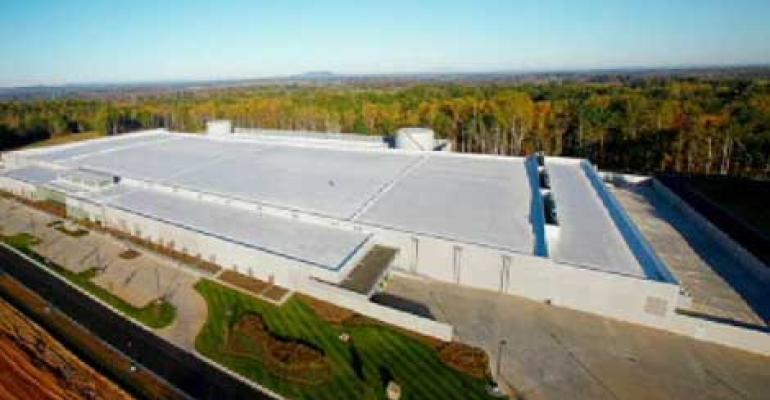
Apple is building huge new data centers in three states, including the North Carolina iDataCenter pictured above. Meanwhile, it's leasing large quantities of data center space in Silicon Valley (Photo: Apple)
Many of the largest cloud computing providers opted to lease new Internet infrastructure in 2012, according to new data from a veteran market watcher. The report highlights the shifting tides in the "buy or build" decision, in which geography and market economics are contributing to a two-tier infrastructure for many of the largest Internet players, with footprints split between company-built data centers and wholesale space.
Apple, Facebook and Microsoft were among the largest consumers of turn-key "wholesale" data center space in 2012, according to Jim Kerrigan, Director of the Data Center Group at Avison Young. Microsoft leased 12 megawatts of new wholesale space in 2012, with Facebook (10 megawatts) and Apple (8 megawatts) not far behind.
The trend is notable because all three companies have recently been building their own massive data center facilities. Facebook has 1.5 million square feet of data center space that is either built or nearing completion, while Apple has finished its huge iDataCenter in North Carolina and is building new facilities in Oregon and Nevada. Microsoft has built its own server farms in seven sites around the U.S. and Europe over the past 5 years.
Economics, Scale and Deployment Speed Drive Decisions
The build vs. buy decision is a key decision for web-scale companies with massive cloud computing operations. Company-built facilities offer economies of scale and can be customized with efficient designs that offer savings on power bills. In the wholesale data center model, a tenant leases a dedicated, fully-built data center space. This approach offers faster deployment of new capacity, and the ability to manage capital spends in regions where it's expensive to operate data centers.
Why the shift from building to buying in 2012? There are several reasons:
Geography: After years of building huge data centers in remote areas, in 2012 the geographic focus shifted back to historic Internet hubs in northern Virginia, Silicon Valley and Chicago. Apple and Facebook have moved armadas of servers to rural locations in North Carolina and Oregon that offer cheap power and cheap land. Cloud builders will continue to do this going forward, but a portion of their infrastructure must always be housed near the Internet's key intersections, where they can connect with dozens of other networks. Both land and power are more expensive in these Internet hubs, resulting in different economics for large-scale new construction. That's why the largest wholesale data center providers have a large presence in these markets.
Market Dynamics: The data center building boom in recent years has brought more supply online in key markets like northern Virginia and Santa Clara, where multiple wholesale providers wind up competing for large deals. This additional capacity favors large "super wholesale" customers that can lease vast chunks of server space. These companies - which include Facebook, Microsoft, Apple and Rackspace - can use their scale as leverage in pricing, and sometimes get discounts by working deals for space in multiple markets. Analysts have expressed concern that this may erode returns for developers of wholesale space, but these mega-deals also have major benefits for providers, as they lock down major tenants.
Advances in Wholesale Data Center Products: Design issues are also a factor in the buy vs. build equation. Facebook's company-built data centers in Prineville and North Carolina featured design customizations that slashed the company's power bill to run its servers. Last month Facebook said it had deployed its Open Compute designs in leased wholesale data center space. Two of Facebook's wholesale providers - Digital Realty Trust and DuPont Fabros Technology - have worked to adapt these designs in their newer data centers. That effort extends beyond Facebook, as seen in Digital Realty's Turn-Key Flex program, which offers additional customization options on "plug-n-play" space.
Is the shift to wholesale leases a long-term trend? Apple and Facebook are continuing to build their new facilities, and appear poised to continue that effort. Rackspace is committed to a wholesale leasing model, while Amazon tends to build out its own sites in retrofitted properties (including some leased from Digital Realty). The wild card is Microsoft, which built its own facilities from 2007 to 2011, but leased wholesale space in three major markets in 2012.





